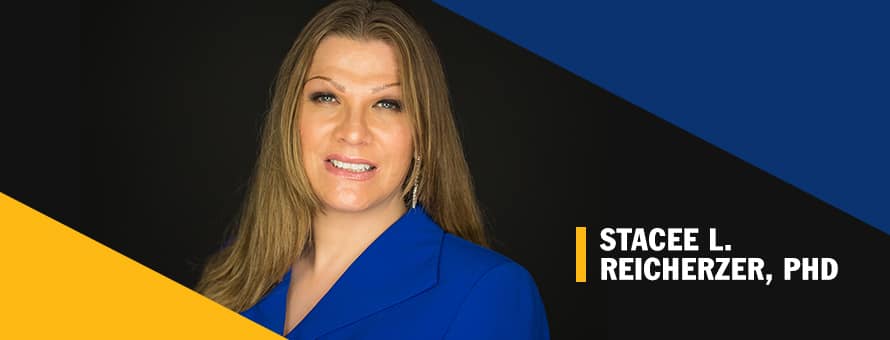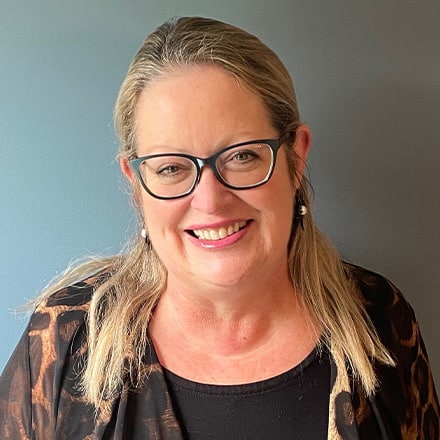What is the Other? A Q&A with Dr. Stacee Reicherzer

Dr. Stacee Reicherzer is a nationally known transgender psychotherapist, educator and writer, who serves as clinical faculty of the mental health counseling program at Southern New Hampshire University. Her book, "The Healing Otherness Handbook: Overcome the Trauma of Identity-Based Bullying & Find Power in Your Difference," was published as part of New Harbinger Publications' social justice series. She recently shared her insights on otherness.
Your new book is a handbook for healing otherness; what is the other, really?
The other is the felt experience that you, I, or anyone else has in the experience of being cast out. When we are trivialized, bullied, oppressed in some way, we experience a very real pain that comes with a message of, “you are less than.” This typically begins in childhood, when kids’ differences are pointed out to them through words and violence. It is fed through subsequent messages over our lifespans that eat at us and which we are constantly fighting against.
What does otherness mean?
Otherness is the experience of being cast out, bullied, minimized for an aspect of who we are. It can be hatred for our racial, cultural, gender, sexual, religious identity or even what someone misperceives as our identity. Sometimes it’s shame and humiliation for the shape and size of our bodies, or conspicuous physical features we have; or how our brains process information differently from those around us.
Otherness is also multigenerational for those whose ancestors experienced severe hardship like enslavement, colonization or the Holocaust, particularly when the othering that was real for the ancestors still exists in some form in the present day.
What is an example of othering?
There are so many! One thing that a lot of readers will relate to is this: if you know someone with ADHD, think about the treatment this person has received throughout their lifetime. Did a teacher in school target them as a problem child and single them out, maybe humiliating them because they couldn’t sit still in the classroom? Did the other kids roll their eyes and act exasperated in response to the child’s ADHD symptoms, perhaps ignoring them and refusing to play with the child? Did the person experience rejection as they grew older and before they learned to manage their symptoms or find a medication that worked for them?
The experience of this individual, who perhaps spent years being treated as a ‘problem’ because of how their ADHD symptoms showed up, is what othering is all about. And throughout such a lifetime, imagine the struggle for the person to ever recognize their gifts that come from the unique way that they have of seeing and engaging the world. To other someone is to not only treat their gifts as garbage, but it is an act of ensuring that the person comes to believe that they are truly less-than because of their differences.
How does being othered affect a person?
It begins shaping our expectations of the world and who we are in it. As experiences of otherness occur again and again, we begin to exist in a state of hypervigilance, which really is fear-based. After all, othering in a world like ours means danger.
In the above example, a child with ADHD would come to recognize the world as one with a lot of hostile people. Fear becomes such a constant that we develop what I call “rules of fear,” telling ourselves musts and shoulds about how to live: “You must work twice as hard” to prove that we matter in the world and are relevant, for example.
When we feel pain, we try and pretend we don’t so as not to appear weak. Why is this? Probably because when we cried in the past, it was exploited and used to further denigrate us. We tell ourselves that we better tone ourselves down, and work to edit ourselves away from authenticity. We deny resentment. And when we fail in all of these things, we ultimately fall into despair.
What led you to write “The Healing Otherness Handbook”?
I’d been doing clinical work at an LGBTQ+ counseling center and was specifically working to address the trauma of homohatred in the lives of a male couple. As I was later talking about the work with a colleague who’s African-American, she expressed her own worries for her son, a 5th grader, who’d been called by a racial epithet at school.
We gathered a group of colleagues to present a workshop called ‘The First Time I Knew I Was Other’ to our counseling students. The goal was to help our diverse student community, who come from all over the U.S. and are of many different backgrounds, in identifying their own experiences of otherness as a method for learning empathy.
For example, a White female student in her late 40s from rural Minnesota who has experienced body shaming throughout her life might not have a lot of exposure to racism as experienced by BIPOC students, but if she could connect with her own experience of being bullied and erased, she could move closer to empathy for the pain of racism. She will never know what racism feels like for the person experiencing it, but she does know how being hated feels. From there, she’s in a better position to witness her client and create space for them. That’s just one example of what was uncovered.
As students shared ways of othering that I’d never even considered, it occurred to me that this was something bigger; that otherness was very real, very deep, and widely experienced. When my very wise leader and mentor suggested to me, “If I was Stacee, I’d write a book,” it gave my otherness work great focus.
What did you learn along the way as you wrote this book?
On a strictly mechanical level, I learned how to write more clearly and concisely in a way that guides a person through healing. More importantly, though, I learned how to bring myself into a work through authenticity. I wanted the reader to know that they’re reading a book by a queer transgender woman who’s got a message of healing for them. That became easier as I grew more comfortable with my writing voice.
So just as I was creating these exercises for readers, I’d stop and actually complete the exercise for myself. That, in turn, helped me feel more authentic. This makes a great deal of sense because of the concentrated effort in using clarity, compassion, creativity, and sass as four tools for change. These tools helped me write a better book.
What do you hope people come away with after reading your book?
I want people to be able to interrogate not only the experience of otherness that they’ve had, that their ancestors may have had, but, also, to begin seeing all of the lies told to them about their worth as human beings. I want them to see the lies and begin dismantling them so that they are no longer controlled by the beliefs that they are less-than and must ‘make do’ with a small space as carved out by otherness.
I want the reader to see a different path and begin making courageous choices that free them. I want to see healthy risks and re-engagement of my tools for change when life becomes challenging. I don’t want to end though with the liberation of the self. I want the reader to feel encouraged to hold empathy for all of those who’ve suffered in otherness, including those whose otherness differs from the reader’s own.
This, I believe, is ultimately what helps us heal the world of all of the social ills that oppression and hatred create.
Pamme Boutselis is a writer and senior content director in higher education. Follow her on Twitter @pammeb or connect on LinkedIn.
Explore more content like this article

Academic Spotlight: Dr. Laman Tasch, Associate Dean of Academic Strategy, Social Sciences

Why Earning His BA in Political Science Mattered to Anthony Fernandez

What Can You Do With a Master’s in Criminal Justice?
About Southern New Hampshire University

SNHU is a nonprofit, accredited university with a mission to make high-quality education more accessible and affordable for everyone.
Founded in 1932, and online since 1995, we’ve helped countless students reach their goals with flexible, career-focused programs. Our 300-acre campus in Manchester, NH is home to over 3,000 students, and we serve over 135,000 students online. Visit our about SNHU page to learn more about our mission, accreditations, leadership team, national recognitions and awards.


